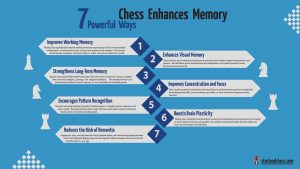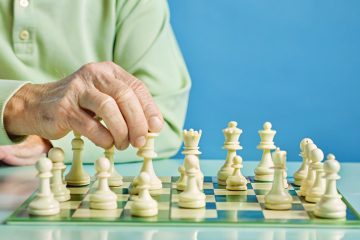7 Powerful Ways Chess Enhances Memory
Did you know that playing chess can do more than just improve your strategic thinking? It can also significantly enhance your memory! “Chess enhances memory” by engaging both hemispheres of the brain, promoting mental agility, and boosting cognitive functions. Whether you’re a beginner or a seasoned player, chess challenges you to remember patterns, anticipate moves, and devise complex strategies, all of which contribute to sharpening your memory.
Studies show that regular chess players develop stronger memory skills compared to non-players. From improving working memory to strengthening long-term memory retention, chess provides a mental workout that is as beneficial as it is enjoyable. In this article, we’ll explore seven powerful ways in which playing Chess enhances memory, offering you a fascinating insight into the cognitive benefits of this classic game.

-
Improves Working Memory
Working memory refers to your brain’s ability to hold information and perform some sort of manipulation on it over short periods. You will always remember the position of your pieces, or your opponent’s moves, or even your overall strategy in the game of chess. Such active mental juggling requires one to engage his or her working memory in constant use, which, over time, strengthens it.
Studies indicate that chess players have improved working memory compared to others. All this training in memorizing moves and strategies boosts the brain’s ability to hold information and draw from it, enabling one to perform well in chess and even in daily life, where memory retention is required.
-
Enhances Visual Memory
Playing chess requires remembering complex patterns of moves and positions of pieces on the board. The need to do so develops visual memory, which in its turn allows remembering such visual information as shapes, patterns, and images with better efficiency. A good visual memory proves to be essential in many common-life situations: reading comprehension, navigation, and even recognizing faces depend on how good one’s visual memory is.
You learn through regular play to visualize the moves and counter-moves that might occur several steps ahead of the present moment. Such visualization, in itself, thickens the skill of the brain for remembering and manipulating visual information, which enhances the ability for better memory retention and cognitive mapping.
-
Strengthens Long-Term Memory
Chess players memorize the opening sequences, techniques for endgame, and a host of strategies. Moving information into long-term memory is engaged in this process. The more use and practice one gets, the stronger the pathways in the brain lead to long-term memory.
It has also been decided that professional chess players have very good long-term memory, which can even tell you about certain games that were played years or even decades in the past. With continuous involvement in chess, your brain gets into the habit of retaining information for the long haul, which may help you through academics, work, and everyday life.
-
Improves Concentration and Focus
Chess is a very demanding game, since it entails very high levels of concentration. Playing to outwit your opponent requires one to be so observant on what happens on the board. The mental discipline helps in strengthening your ability to be focused and concentrated, the prime factors that directly relate to remembering well.
With heightened concentration, you are able to encode information into memory more effectively, and that in turn promotes faster recall of the same information. This would further help in other aspects of life, such as studying for exams or managing work tasks or learning new skills.

Explore the full range of topics on chess and personal growth at [startend chess]
-
Encourages Pattern Recognition
Pattern recognition is one of the major skills in chess, which is very important in formulating your strategy and predicting the moves of your opponent. As you go through more and more games, you begin to note the repetition in the patterns of how pieces move, common traps that fall, and also winning sequences. In this repetition, your brain works out a way of remembering them much quicker for further implementation in later games.
Pattern recognition bears a very close relation to enhanced memory because, in the process of recognizing patterns, one always draws from past experiences to apply to a new one. This can then be transferred to different domains like mathematics, coding, and problem solving, where the recognition of patterns is necessary.
-
Boosts Brain Plasticity
Chess is also acknowledged to enhance the brain’s plasticity-the non-specific ability of the brain to change and adapt in response to new experiences. The mental workout one gets playing chess does stimulate the growth of new neural connections, especially in areas that deal with memory and cognition.
A study published in the New England Journal of Medicine concluded that playing chess activates the brain’s plasticity by involving both hemispheres of the brain. Thinking ahead and adapting to a new move are constant works, which make those neural pathways resilient to stand you in good stead later on for acquiring, retaining, and recalling information with ease.
-
Reduces the Risk of Dementia
Several studies have indicated that mentally engaging tasks, like playing chess, might help reduce the risks of cognitive decline and dementia among elderly people. Playing chess is a great exercise for your brain, building cognitive resilience by sharpening your memory.
One study undertaken by the Albert Einstein College of Medicine finds that elderly individuals who regularly engage in playing chess or other similar mental activities reduce the risk of dementia. In doing so, a person continuously challenges his or her brain, and, as a result, his or her memory and cognitive abilities are always in top shape; this has been considered a protective mechanism against decline related to age.

Conclusion
Chess is far more than a mere board game; it’s a powerful tool for mental development that offers substantial benefits for memory enhancement. When you play chess, you engage in a full-brain workout that strengthens both your working memory and long-term recall. Whether you’re remembering complex patterns, planning several moves ahead, or adapting to an opponent’s strategy, each game challenges your mind and reinforces your memory. By incorporating chess into your routine, you can sharpen your cognitive abilities, making everyday tasks easier and more manageable.
Moreover, the benefits of chess go beyond memory improvement; they help reduce the risk of cognitive decline and dementia. Regularly challenging your brain with a game of chess stimulates new neural connections and improves brain plasticity, keeping your mind sharp as you age. So, if you’re looking for an engaging way to keep your brain active, boost your memory, and enhance your cognitive health, playing chess could be your best move. Experience for yourself how chess enhances memory and transforms the way you think!
If you’re interested in diving deeper into this topic, we’ve prepared a podcast just for you. Feel free to listen and explore more insights:
References:
- Sala, P., Gobet, F., Trinchero, R., & Ventura, M. (2017). “The impact of chess instruction on the academic achievement of children: A meta-analysis.” Educational Research Review, 22, 65-82.
- Burgoyne, A. P., et al. (2019). “Chess and cognitive skills: Evidence from a randomized controlled trial.” Educational Psychology, 39(1), 82-95.
- Miller, E. (2014). “The Effects of Chess Instruction on the Academic Performance of Students.” International Journal of Instruction, 7(1), 117-136.
- O’Boyle, J. D., & McDonald, D. (2013). “The role of working memory in chess.” Psychological Science, 24(5), 855-860.
- Albert Einstein College of Medicine. (2012). “Mentally engaging activities, including chess, can help reduce dementia risk.”
- Berg, K. A., & Wendel, J. (2018). “Chess and the Brain: How Playing Chess Can Improve Memory.” Neuroscience & Biobehavioral Reviews, 92, 162-173.
Recommended Articles:



0 Comments